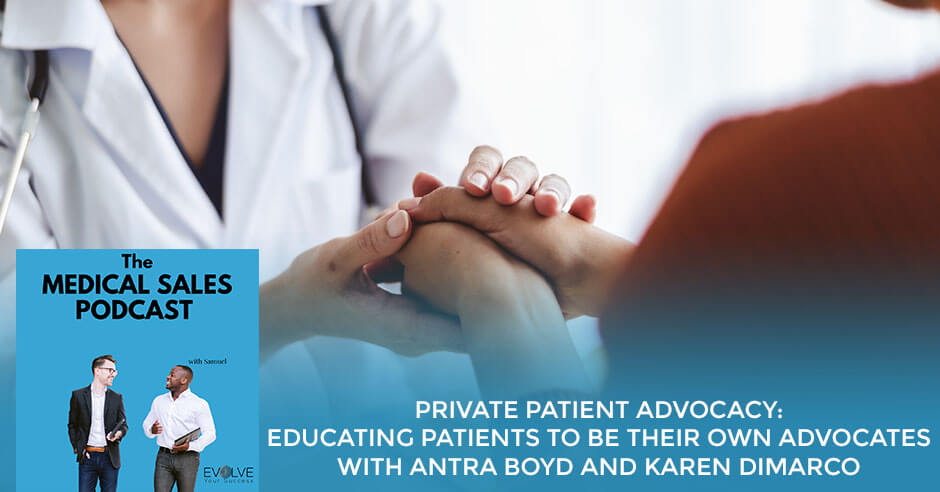
In a world of medical and health jargon, it can be difficult for patients to understand the kind of care they are getting. Sometimes, beyond the language, it is in the way health professionals communicate to the patient and their families as well as to each other. Today’s guests, Antra Boyd and Karen DiMarco, both saw the need for private patient advocacy, helping patients learn to advocate for themselves. In this episode, they join Samuel Gbadebo to talk about the problems they saw and what needs to be addressed. They also share their perspectives as nurses on how important the medical sales role and pharmaceutical sales rep are and what value they can provide to their clients.
—
Watch the episode here
Listen to the podcast here
Private Patient Advocacy: Educating Patients To Be Their Own Advocates With Antra Boyd And Karen DiMarco
We have with us two special individuals by the name of Karen DiMarco and Antra Boyd. They created a platform called our RNegade that is changing the face of nursing education through CE credits. They are also patient advocates from their experience in nursing. In this conversation, this is a two-part interview, we discussed not only what they are doing and how they got to where they are but the best ways to interact with the medical sales community from a nurse’s perspective.
This is Nurses Week. it’s my pleasure to bring two nurses that have had a wealth of experience to talk about their experiences and how they are impacting the medical community. Whether you are a medical sales rep, you are someone that’s trying to get into the field or you are leading the way for medical sales professionals, this is an episode you want to read to. As always, thank you for reading the show, and I do hope you enjoy part one of this interview.
—
Hey ladies, how are we doing?
I’m good.
Fantastic. Good to be here.
Nice to be here.
I’m glad to be with you guys as well. We have Antra Boyd and Karen DiMarco but I will let you guys introduce yourself. Please tell us who you are and what you do.
My name is Antra Boyd. I am a nurse. I have been a nurse for many years. I graduated with my Bachelor’s degree in 1996 and served in the United States Navy for six active-duty years. That’s where I grew up as a nurse. I had a Filipino nurse that was a contractor. She taught me everything she knew about medical surgical nursing, and then I went to the recovery room and I couldn’t stand strong twenty-year-old Marines. They were the biggest crybabies after surgery. It drove me crazy. Big muscular Marines and they would cry. I hated it. I went into the operating room where my patients were effectively asleep and stayed there for twenty-plus years.
What I loved about the operating room was that I got to be an advocate for the patient because under anesthesia they can’t advocate for themselves. It was a good place for me to be because that’s where my whole nursing career has led me is, my advocacy. All nurses are advocates in whatever field they choose but that was front and center. That’s what I did.
I left the operating room to start my own patient advocacy business, with another colleague of mine because we were spinning our wheels inside the system. We saw poor outcomes and couldn’t figure out how to change it from within so we thought, “If we can walk alongside a patient and help them navigate the healthcare system, maybe they would have better outcomes.” We have a thriving business here in Portland, Oregon called Connected Care Patient Advocates. If that wasn’t enough, Karen and I, who we have been friends with for a long time, we always knew we were going to do something and we started a business to serve nurses which we can talk about.
Antra, are you still a practicing nurse?
It’s probably the freest and purest form of nursing because you get to use that critical thinking brain. I have been a nurse for many years. I graduated in ’96 but I started nursing in the ICU as interning and stuff in ’94. I’m covering my eyes, looking at them out of the Southwest, and my finger lands on Las Cruces, New Mexico. I was 22, packed my car, and drove out to Las Cruses. I followed the blue signs with the white H to the hospital because they wouldn’t hire new grads in ICU in the Northeast, and there was a shortage in the Southwest.

I lied my way into an interview and that was my first ICU job. ICU flight nursing trauma. I traveled as a single person and then traveled following around my serial entrepreneur husband. Great experience but same as Antra. I kept seeing that. If the patient was a medical professional or they had one in their family, they had better outcomes. The shorter length of hospital stay, lower morbidity, and mortality because they or the family knew what questions to ask or the how to get a second opinion, and that threw my justice scale off.
I spit myself out of the hospital system in 2011. I was done clinical nursing in 2014. That’s when my practice became full-time for me. Private patient advocacy. I went through the same program Antra went through and then that evolved. It went into naturally patient advocacy, and corporate wellness, and then did some research. I kept falling into things and then collecting sea glass and coaching certifications. I added that to my practice and working one-to-one with people, and then doing a lot of health teaching. Psycho neuroimmunology health programs all over. Antra and I started this functioning thing.
Do you also a practicing nurse now?
I’m not practicing as a clinical nurse. I’m not practicing purely like Antra’s practicing. I would say I do one-to-one work and use my nursing brain but it’s more of like a hybrid nurse coach, health educator thing.
Both of you saw the need for private patient advocacy. You want it to be a voice for patients. What happened in the nursing space that turned you onto that made you say, “There’s a problem here and this needs to be addressed?”
For me, it was inside and outside the nursing space. It was hearing friends or family members outside of the hospital say, “Tell me their horror stories.” Not that I was unfamiliar with them. I saw them all the time but the feeling of, “If I was there that wouldn’t have happened. If I could have been there, that wouldn’t happen.” That’s what inspired me. It was like, “I have to be there.” That feeling inside of me like, “I could’ve done something if I would there. I would have known what to do and what to ask. I would have known what to demand.” The standard of care. That was it for me. I don’t know if that answers your question.
For me, working in an operating room and seeing sometimes how poorly teams were together, how they didn’t collaborate, how somebody could come in a bad mood and it would throw everybody off. You could see a direct correlation between a dysfunctioning team that didn’t communicate and how a patient did.
While I was lucky enough to never be part of a poor outcome, I saw poor outcomes. In several years you are going to see them. I tried in the hospital to change those dynamics. We brought in stuff like effective communication. All of these different things were in style at the time. I go in and would in-service everybody. People that I love to work with, that I knew well would sit in an in-service and look at me with pure disdain. Like, “What do you mean? That’s not going to work.” It was so frustrating to see that people didn’t get it. The other thing was the silos of care. The operating room is a silo of care. What happens to a patient when we move them from the operating room to the recovery room? What happens to the specimens that we take out for a cancer diagnosis perhaps?
There are so many things that get lost in communication between silos of care, and I hated it because of patient champions or better communication. All of these things trying to improve and it was spinning my wheels. I was like, “Karen, I spit myself out of the system. I could help somebody so much better on the outside.”
When you say on the outside as patient advocates, who are you impacting? Are you impacting patients and their families to be better advocates for themselves? Are you impacting education around office staff and the providers to do better? Are you impacting a different perspective? Who’s being impacted as patient advocates as you guys are?
First the patient, number one.
You are training the patients to be better voices for themselves.
[bctt tweet=”The operating room is a silo of care.” via=”no”]
Their families also. You could use the justice system. I often use that as a metaphor. In this country, if you cannot afford an attorney, one will be provided for you. Why? It’s because the judicial system has its own language. It’s convoluted and so complicated, and you have to have an advocate for you to protect you from fines or loss of freedom.
Those are the two outcomes. In the judicial system, your risk is fine or freedom. In the medical system, it’s injury or death. There is so much that goes unreported and stuff. There’s a debate but in some areas, our medical system is the third leading cause of death in this country. That’s not even nursing homes, medical errors, and things that go unreported and there’s a real problem with reporting. Let me tell you, I was discouraged to not report things that went on.
You have the hospital ombudsman and risk management. That’s the basic level of one that will be provided for you but then you can also, in the judicial system, hire a real shark. You can hire somebody who’s skilled and good at defending people. Unfortunately, people who hire us are those people who can afford a high-priced attorney. It’s in parallel.
I would say the other thing that bleeds out is when we teach the patients and the families and educate them how to advocate for themselves. That’s how I got into corporate wellness. I was hired by a guy who owned a company, a CEO. I have worked with his wife, his daughter, and then work with him. He’s like, “Why doesn’t everybody know this? You have to come in and teach my staff. I want this for my staff and my community.” That’s how it got out and spread to other people but unfortunately, the people who we have to keep the lights on and the people who need us most, the most vulnerable are the people who can’t afford us. That’s why we are also creating educational programs and we do a lot of pro bono work too.
When you think about it too patients don’t know that they can ask questions and demand the very minimum standard of care. In our country, we have been so conditioned to believe that the doctor knows best. It doesn’t occur to us that we can disagree, get a second opinion, and ask questions. A lot of the work we do is teaching people like, “You don’t have to be afraid. You can ask questions.”
Physicians and providers like it because people are engaged in their care. They are taking an interest in their own health. As advocates, we are not only teaching patients that but we are helping the providers because we make their job easier by teaching these patients, these skills, and by reinforcing what the physicians and providers are sharing with their patients.
If a physician has 5 to 10 minutes with a patient in a primary care appointment, he can speak to whatever he or she needs to speak to in that short amount of time, and then we can come in and say, “This is what he said,” so that the patient doesn’t leave the office and be like, “I have no idea what that even means.” That is the standard. Most patients have no idea.
If they are being faced with a serious medical challenge, then they don’t even hear it in the first place. How are they ever going to get the education when doctors don’t have the time and when they don’t understand or are up in their heads about something scary that’s happening to their bodies. It has been a super-effective way in my experience for patients to get the best care and for providers to make it easier on them.
When it comes to this, you mentioned teams. You worked in a number of teams where you felt that if the team worked better, there would have been a better outcome. This is what prompted you to want to get involved. When it comes to this, do providers see you as a friend that’s going to help the whole system be better or do they see you as, “Here comes Antra and Karen correcting our patients and getting them to have a voice?” How is it perceived?
It depends on their level of insecurity.
It is what it is. It’s a unique experience.
There’s some truth to that, though.

I will receive that. Think back to when you two were working with your teams and there was an element in there that’s very relative to our audience. That’s the medical sales professional. Just so people can understand because a lot of people that are reading either want to get into medical sales, are in medical sales or are somehow connected and understand enough about medical sales. From your experiences as nurses, how important is that medical sales role? I want to know it for the medical device side and pharmaceutical side. Let’s start with the medical device side. How important would you say that their role was from what you guys saw?
I can speak to that side. You speak to the other side, Karen. I would say it’s key. As an operating room nurse, I was always working with medical sales reps. I always learning about new medical devices. I was an orthopedic joint nurse and I remember when the Mako machine for total hip replacements came onboard. That is incredible technology but it’s complicated and complex.
Having that medical rep there in the room to help the entire team learn the equipment and use it the way it was designed to be used with no workarounds or MacGyvering this or that. Nurses are great MacGyvers but you don’t want to MacGyver a Mako machine. That doesn’t make any sense. Having them there to teach and educate was imperative. You couldn’t do it without them, in my experience.
What I found was the ones that were good at what they did were extremely knowledgeable. They knew their stuff backward and forwards. I’m sure they could recite and talk about it in their sleep. That was so helpful to the team. It was like, “The surgeon can do what the surgeon needs to do, which is surgery.” They don’t have to rely on us to get it exactly right because we didn’t have that education.
We get the watered-down of what a medical sales rep in that position gets because they go through some extensive training. Some of my good friends are medical sales device reps because they not only were fun, engaging, kind, and cool people but also they knew what they were doing and I had mad respect for that.
Sticking with that before we go to Karen but when it comes to these medical by sales reps, earlier you mentioned going back to these outcomes and you wish you had seen teams work better. Medical device sales reps are part of that team. For those reading, outside of their knowledge and the fact that they are the main resource because of that procedure utilizing their device, how much can they impact this chance to have this better outcome that you were discussing? What role can they step up to play to make sure it happens even better?
The ones that are good at what they do are the ones that engage the whole team. There’s not a hierarchy. There shouldn’t be a hierarchy in an operating room because we all have jobs to do. Even the person that cleans the blood up off the floor. I wouldn’t know what chemicals to use to clean the floor and I wouldn’t want to send my patient into a dirty room covered in blood. We all have an important role. In the hierarchy in OR, I understand that the physician is the lead of a team, which is fine. We need leaders. We also have to have a solid respect for every member of the team.
Medical sales reps go a long way in helping to create that dynamic because they see the surgical technician as equal to the nurse and surgeon. The ones that are good recognize that we are all part of the same team and that we are all trying to get the best outcome for the patient. In my opinion, the best ones are the ones that recognize that and they engage with everybody on the team, and don’t speak just to the surgeon or the nurse. They talk to all of us. They teach all of us. A lot of times there’s education that the anesthesiologist and housekeeper need to know.
How do we effectively clean this machine, and make it ready to go for the next case? In my opinion, that’s the best thing a medical rep can do because that promotes good outcomes. It’s a team that effectively works together well, that communicates together well, that learns. The medical rep has the stuff to learn too from us. What about the patient? What important things do the medical rep need to know about a particular patient? What do they need to know about a room that we are using? There are things that medical reps need to be open to learning as well. Those are the ones that make an excellent part of the team.
Karen, please give us your idea.
I have a question for you. Do medical device reps looking for new ways to innovate to get the device that they are representing out to more hospitals in utilization? Is that part of what they do? Is this a standard practice?
You have associate sales reps, sales reps, and clinical specialists. It depends on what your specific role is but any general sales rep or a sales professional wants to be able to have their device utilized by more accounts. Simple as that. They are looking for ways to do it.
[bctt tweet=”The people who need us most, the most vulnerable people, are the people who can’t afford us.” via=”no”]
I was thinking that my brain was still on the patient advocacy thing. When we educate communities, people where health literacy is not that great, those people know to demand the standard of care. That, from a bottom-up kind of thing, is what improves what will eventually from a grassroots level improve. Patient safety and probably the medical system when they know that they can demand better staff ratios, “I’m not bringing my mom here. Are you kidding? You take 4 to 1 in an ICU. I don’t think so. We are not going to the hospital,” when they have that level of knowledge.
I was applying that to you, guys. Do you do community education programs? Let’s say this hospital uses the latest robotic device in their surgical centers. If the community knows that stuff and they are going to those hospitals, there’s a big thing in there. It’s like the pharmaceutical commercials on TV at night. You never see this hospital has this and that. “Go here.” That could be a whole uncharted and untapped way to improve and grow a particular device or a whole company.
Do you know how many clients I have had who call me, then they are like, “I’m having my hip replaced. The doctor I’m seeing is going to do a hip replacement. He’s going to make an incision and do it manually. Are there other options?” They don’t even know that if that particular physician doesn’t do robotic surgery, they are not going to tell him that that’s an option. How do you even know?
You want to see from medical device manufacturers. Mostly we will stick with them. I want to see more education for the patient about what procedures are they going to experience.
To people in general, as a patient advocate, I want my clients to make fully informed decisions. Hip surgery is a great example. If they are only going to one doctor and he’s going to do it the way they have been doing it for 50 years and maybe he’s great but I want my client to have the benefit of making a fully informed decision. We also have the robotic option.
If you were a medical sales rep for Mako machine or whatever robotic machine is out there, not only would you increase your sales by educating the public because then they would demand that that’s what they wanted but they would also be fully informed.
Depending on the condition. Some devices have entire community liaisons or the sales rep is involved in recruiting patients to be eligible for the procedure. It does depend on what condition we are talking about.
Unless it’s a podcast, where would you reach a huge audience of people to let them know about the latest devices outside of the hospital system?
I wonder as far as patients are concerned if that can get pretty technical for the patient to understand what’s going on. When a patient hears that a certain decision needs to be done, how technical do you get with that patient?
Antra told about what it’s like in an OR, and it’s a brilliant example. When a medical device rep going on a floor, how many times are you talking to the patients? Do you want people to understand and be clear? Learn to teach patients.
You then go into what the manufacturer would allow and compliance. A lot of sales reps are not allowed to talk to the patients. Again, it depends on the condition. It depends on the disease state but for compliance issues alone, there have to be some lines of separation depending on the disease state and condition.
I’m more talking about the clinical specialists who go and teach the staff how to use equipment that has been purchased like if you can teach it to a twelve-year-old.

If you can break it down to make it easier for the patient to understand and include them in the process, then everybody would see better outcomes.
That’s where you get the collaboration. If you have a medical rep who’s teaching me the nurse’s stuff, then I can distill it down for the patient as long as I understand and know it. Oftentimes I do that with joint replacements like, “What are the options?” It’s pretty simple like, “This is why you might want to try talking to a physician who does it robotically.”
That doesn’t mean that a physician doesn’t do it as an as good but this is the advantage and I can continue to fill it down. To your point, an earlier question is that’s why it’s important for nurses, clinical specialists, and medical sales reps to be tight because that’s how patients get those options and the better outcomes.
On the pharmaceutical side, Karen. What are you seeing when it comes to how pharmaceutical sales reps can provide more value to their clients from a nurse’s perspective?
Antra wanted me to take this one and I’m afraid I don’t have much to say except that I love it when they would come in and teach. To kick it up a notch, so your audience isn’t going, “Where the hell is she going with this?” They have probably already done that a couple of times. I worked the night shift most of the time, so I didn’t get to see them that much but when I worked the day shift and we would get an in-service, a lunch, learn, and an educational program. I will be honest. In the areas I worked, it was always so busy. I didn’t get that much interaction with them unless they were teaching us about a new drug.
Would you have liked to see more interaction?
I would have loved to but the longer I was in nursing, the less time I had for anything but trying to keep my nose above water. Why I ultimately left was because there was only so much energy and resources to go around. The people who had an advocate with them were where those resources went and I didn’t want to be part of the division anymore.
This is the unfortunate truth and pharmaceuticals because they have a body of knowledge about the standard of care that should be delivered. The unfortunate thing is the staff is on their toes when they know they are being watched. I went off on one but unfortunately, I didn’t have that much time to interact.
That’s the thing on the pharmaceutical side because they are going into doctor’s offices and into areas where the nurses don’t have time. That’s one area where medical reps could get innovative and figure out ways to create those relationships knowing that nurses were crunched for time that you couldn’t interrupt them in the middle of a busy ICU shift. Where would you find them and develop those relationships? In an operating room, it’s easy. They are there and you are working with them all day long.
You are fighting for their attention in an office. It’s a lot more challenging.
In an ICU or on a med surg floor, you are not going to get that. I would encourage any medical or pharmaceutical sales rep to think about, “How do I develop relationships with nurses in these places?” It’s not just the doctor. The doctor’s going to give you time depending on however it is that you guys get face time with them.
There’s already that relationship because that’s how you sell pharmaceuticals. How are you going to get in front of the nurses and teach them to teach their patients about these drugs so that these patients get better outcomes? It lies on the medical sales rep to do that because nurses can’t. There’s no time.
[bctt tweet=”If you can break it down to make it easier for the patient to understand and include them in the process, then everybody would see better outcomes. ” via=”no”]
My brother is a surgeon. When I lived in Cleveland, a couple of times he was invited to these fancy dinners and pharmaceutical things. He’s a surgeon so there were medical device things where you to talk about, new devices. We are at this place called Blue Point in Cleveland. It was like this nice seafood restaurant. I’m like, “Are these the things you go to all the time? Nurses never get invited to these things. The only way I get invited is at my brother’s date.” At the same time, that’s understandable because nurses don’t have control how they should because they are the ones running the show but they don’t have as much control over what gets purchased.
They should. I will tell you at a big operating room conference, the floor when we go to the expo is all medical devices. It’s a massive auditorium and you know who goes there? It’s not the physicians that go to that conference. It’s the nurses. It’s the clinical specialists and educators. They are the ones that are at that conference. It be who’s. Any medical device or pharmaceutical rep to get to know the nurses. It doesn’t matter what area the nurse works in. If they can get in and develop relationships, there’s an influence there.
Let’s talk about that because you made a good point. The example you use is pharmaceutical, it’s up to that rep to figure out how to get that nurse’s time. Think back to when you were busy and making things happen, and a rep tries to stop you to get your time. What do you want to hear from that rep that would even allow you to consider, “Let me stop and give them a couple of minutes?” What approach would you be most receptive to? This is completely subjective but I’m curious to know.
—
That was part one with Antra Boyd and Karen DiMarco and their platform RNegade. Make sure you tune in next time for part two as we dive a little deeper into what they are doing, their perspectives on the medical sales community and how they interact and changing the face of nurse education and making connections across the medical sales community with people that are all about patient advocacy and impacting patient outcomes.
Maybe you are reading this episode and you are thinking to yourself, “I want to understand more about what these ladies are doing. I want to work with people like these ladies.” Maybe you are a nurse, someone in a different industry or someone that’s always thought about being in the medical sales industry. If that’s you, then you need to visit EvolveYourSuccess.com and select Attain A Medical Sales Role and get in touch with someone from our staff here at Evolve Your Success and learn how to get into the position of your dreams.
Many people are learning more about this field and are looking for ways to get in. Stop being one of those people. Be someone that actually gets in, and takes a big step toward making that happen. If you are someone in the field, you are thinking, “I want to have better interactions with my accounts. I want to get better access. I want to earn or do more this year, or attend the president’s club within my organization.”
If you are in the medical sales field and you want to make new moves as a sales rep, visit EvolveYourSuccess.com, and select Improve Sales Performance. Fill out our short application and get in touch with someone from our staff and learn how this can be a groundbreaking year for you. We always do our best to bring you guest that brings you innovations, insight, and different ways of doing things in the medical sales community. Make sure you tune in again for another episode of the Medical Sales show.
Important Links
About Antra Boyd

About Karen DiMarco

Love the show? Subscribe, rate, review, and share!
Join the Medical Sales Podcast Community today:



















































































